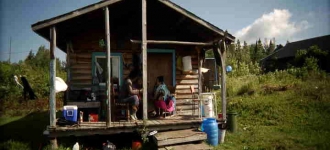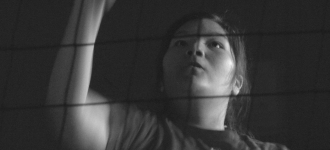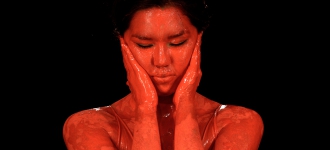Wapikoni Mobile, a motorhome turned into an editing and screening room, roams along the Canadian highways, providing inspiration, space, and tools for creating art among first nation communities. The vehicle was named after a 20-year-old Atikamekw girl, who lost her life in a car accident on the badly maintained road leading up to a reservation. Wapikoni Awashish, with her pure heart, bravery, and dedicated community-building work, had earned her people’s trust; she was the primary candidate for the position of tribal chief.
Manon Barbeau, a Canadian documentary-film director, named this unique van, which began its journey in 2004, after her. Wapikoni’s senseless death, and the fate of the indigenous peoples in general, upset Barbeau and she decided to take action.
As a director, Barbeau had previously worked with children living on the streets of big cities, and those living on reserves, and experienced the joy of co-writing scripts based on their lives. Such films have healing powers, both through the artistic process of their creation and through their introduction to the audience. Barbeau knew that the departure of the traveling film studio, and with it the filmmakers and social workers who became friends with the participants, would leave behind a void. Therefore, she decided that the van should make a yearly return, and after some preparation by the local organizers, spend a month on the reserve. In between these occasions, participants could plan their upcoming movie, promote the videos shot in similar communities, and otherwise prepare for the arrival of the Wapikoni team.
Since its establishment, the Wapikoni Mobile has visited 42 communities of 14 indigenous populations in Canada, and has carried out film workshops in Bolivia, Peru, Norway, Turkey, and Jordan. It has trained more than 5,000 people, inspiring them to create their own documentaries or musical works. As a result of the trainings, participants have had a boost in self-esteem and improved their ability to manage stress, they feel less isolated and less dependent on drugs, and have strengthened their intergenerational and intercultural connections with other native communities. At the same time, they have acquired practical knowledge about films, and continue to take part in shaping the contemporary indigenous film industry.
There was no sign of all these successes in 2004, of course. That was when I first found myself in the entrance room of the Wapikoni Mobile, at the outset of the project. Since then, I have consistently followed the film studio’s journey in Québec, camera in hand, and my friendship with Manon has deepened over the years. Last year, Isabelle Poupart, the Canadian Ambassador to Hungary, has made it possible for us to organize the first ever representational workshops in Budapest, titled “Look Up and Speak Up!”, based on the Wapikoni films. The workshops will continue this year in the framework of the 15th Verzio Film Festival, and will include movie screenings and discussions, as well as a very special guest – Manon Barbeau!
Zsuzsanna Kozak, media literacy educator, Visual World Foundation
| Mathieu Vachon • Canada • 2009 • 51min • French, Algonquin | Alicia Mollen • Canada • 2016 • 3min • French | Melissa Mollen Dupuis • Canada • 2015 • 3min • French |
| Katherine Nequado • Canada • 2018 • 3min • Atikamekw |




